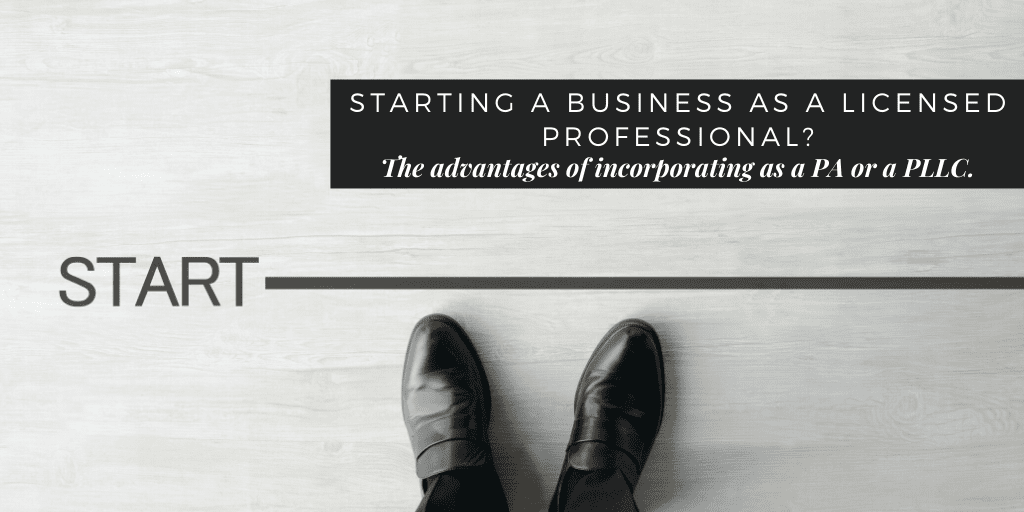The Professional Service Corporation: A Deeper Dive Into Florida Statute Chapter 621
Reading Time: 4 minutes
The P.A., or P.L.L.C. is a corporate structure specifically designed for various licensed professionals who wish to hang their shingle and start their own practice. Fla. Stat. Ch. 621, also known as the Professional Service Corporation and Limited Liability Company Act proscribes certain benefits to those corporations and its members that only the P.A. or P.L.L.C. are entitled to.[1] The vaunted “P” after the name of the corporation connotes that the company renders a professional service through its members, all of whom are licensed to practice in their specific fields. This article analyzes Chapter 621 and the certain advantages afforded to professional services corporations, and why incorporating as a PA or PLLC is a considerable option for a professional deciding how he or she wants to structure their practice.
Only Professionals of the Same Field Can Have an Ownership Interest in a PA/PLLC
Fla. Stat. Ch. 621 works in congruence with Fla. Stat. Ch. 607 (The “Florida Business Corporation Act”) and Fla. Stat. Ch. 605 (The “Florida Revised Limited Liability Company Act”), however, it provides several distinctions distinguishing a PA or a PLLC from other corporations. The main distinction with the PA or PLLC compared to other corporate structures is that organizing/incorporating as a PA prohibits nonprofessionals or professionals of a different field to obtain an ownership interest in the entity. Fla. Stat. § 621.05; see also In re Adams, 389 B.R. 762 (Bankr. M.D. Fla. 2007) (prohibiting professionals who have a membership interest in a professional services corporation from owning its interest as tenancy by the entirety with a nonprofessional spouse).
Additionally, the Act prohibits any professional service corporation from issuing “any of its capital stock to anyone other than a professional corporation, a professional limited liability company, or an individual who is duly licensed or otherwise legally authorized to render the same specific professional services as those for which the corporation was incorporated.” Fla. Stat. § 621.09. Also, no shareholder or member of a professional service corporation can sell or transfer his or her shares except to (a) another professional service corporation; or (b) another professional of the same field. Fla. Stat. § 621.11. That means if you are a law firm, for example, only lawyers can have an ownership interest in the practice, which is separate from a non professional service corporation incorporated under Fla. Stat. Ch. 607, such as local mom and pop shop, or other business ventures where any person no matter their occupation can have an ownership interest in the company.
An advantage lies if a creditor attempts to go after the PA/PLLC. Because most of the time, the creditor (such as a bank) is not of the same profession as the PA/PLLC, thus the creditor is unable to levy shares of the PA. The corporate structure thereby acts as a form of asset protection for its members insulating its shares from collection by nonprofessional creditors.
Members of a PA or PLLC are Not Liable for the Corporations Debts
Similar to an Inc. or an LLC, members shareholders, officers, and directors are not personally liable for the PA or PLLC’s corporate debts or other business liabilities. This holds important if a creditor attempts to obtain a judgment against a PA or any debts. See Porlick, Poliquin, Samara, Inc. v. Compton, 683 So.2d 545 (Fla. 3d. DCA 1996) (holding that the president of a law firm organized as a professional service corporation was not personally liable for corporation’s contractual debt to pay an engineering expert). However, members should know that the corporate structure does not shield them from personal liability for malpractice. Members are liable for their own “individual acts of negligence, wrongful acts, or misconduct or for acts committed by employees under their direct supervision.” Fla. Stat. § 621.07. The professional service corporation itself can also be held liable for the misconduct of one of its members. Id. However, other members of the professional service corporation will most likely not be personally liable for the misconduct of another member, except for in egregious circumstances.
Conclusion
Incorporating as a PA or a PLLC has certain advantages for professionals that can only be obtained by incorporating under Chapter 621. If you are a professional, and looking to start your own practice, or a practice looking to re-organize its corporate structure, the professional service corporation is a route worth considering compared to other mediums such as the LLC or a traditional corporation.
[1] This article does not outline the tax benefits afforded to Professional Service Corporations.


